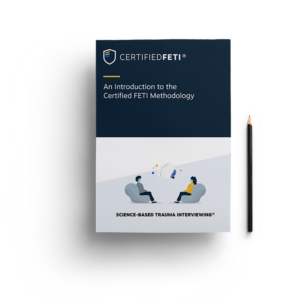The Certified FETI Methodology
The Forensic Experiential Trauma Interview® is a science and practice-based interviewing methodology informed by the current research on the neurobiology of trauma and memory. FETI® provides interviewers with a framework to maximize the opportunities for information collection and accurately document the interview in a neutral, equitable, and fair manner.
This paper serves as an introduction to the Certified FETI Methodology.
![]()
What is Certified FETI?
The Certified FETI Methodology (“Methodology”) provides the methods, principles, and rules for interviewing persons who have experienced high stress, trauma or other events. This methodology addresses the need for interviewer accountability, standardization, provision of a certification process, and official curricula.
The FETI Framework™
A key part of the Methodology includes the FETI Framework™, which outlines the skills, abilities and information necessary to conduct a Forensic Experiential Trauma Interview. The Framework is made up of four elements: Opportunities for Information™, Neutrality and Equity, Science and Practice Based, and the Continuum of the Interview Experience™.
The Framework helps interviewers to understand the need for a Participant-Centric Process™ which acknowledges the individuality of each participant and takes into consideration their ability to participate in the interview process.
The Framework emphasizes the importance of being intentional about the interviewer persona and clearly demonstrates the separation of an interview from any other process, such as an investigation or evaluation.
The Framework underscores the importance of role, and therefore only provides instruction for the role of interviewer. An interviewer’s role is not to determine, classify or gauge a participant’s experience. Attendees at Certified FETI courses learn how to “collect the dots” not “connect the dots” during an interview.
On Science and Trauma
Certified FETI recognizes any life event has the potential to be stressful or traumatic. Information on neuroscience and brain-based responses informs our Methodology to provide a better understanding of how high-stress or trauma may affect behavior and memory.
Certified FETI courses emphasize that this information should never be used in an interview in an attempt to determine whether or not someone has experienced stress or trauma.
Who is FETI for?
For the interviewer, Certified FETI is for persons of all disciplines who interview. Many of the interviewers we train work in, but are not limited to, the following professions: law enforcement, higher education, advocacy, criminal prosecution, healthcare, and administration. The only prerequisite to be a Certified FETI practitioner is a minimum age requirement of eighteen years.
Certified FETI is neutral and equitable. The Methodology identifies interviewees not as victims, witnesses, suspects, complainants, etc., but as “participants.” The Methodology is applied the same for everyone regardless of their status in another process outside of the interview.
The goal of a Certified FETI interview is to obtain what the participant is able to tell the interviewer. It does not attempt to answer a predetermined list of what an interviewer thinks is important to understand what happened.
The mission of Certified FETI is to maximize opportunities for information. A Certified FETI interview does not determine “what happened” nor does it determine the accuracy of the information or credibility of the participant.
![]()
Certified FETI Metrics
The interviewer demonstrates appropriate neutrality and equity. For example, the interviewer is not aligned with or supporting any side and remains impartial and unbiased, not assumptive or judgmental.
The interviewer opens the interview with empathy. This can be as simple as expressing appreciation (e.g. ‘Thank you for being willing to speak with me today’) or a more in-depth exploration of the System of Security™ taught in the Introduction to FETI course.
The interviewer demonstrates compassion and genuine empathy to the participant. For example, it would be appropriate for the interviewer to say to the participant, “I appreciate you being willing to speak with me.”
The interviewer maintains their appropriate role during the entire interview. For example, the interviewer does not attempt to “connect the dots” and focuses only on “collecting the dots”.
The interviewer uses Brain-Based Cues™ throughout the interview. Brain-Based Cues™ shorten and simplify the way an interviewer provides opportunities for the participant to share information about aspects of their experience.
An interviewer does not ask compound, leading, assumptive, minimizing, sequencing, yes/no or why questions during any part of the interview.
The interviewer utilizes Unidirectional Interviewing™ during the entire interview. Unidirectional Interviewing™ assists an interviewer with understanding the difference between an interview and conversation allowing for information to come from the participant without interruption or input from the interviewer. This includes not paraphrasing, changing the participants words, confronting or providing the participant with advice, opinion or personal information from the interviewer.
The interviewer is intentional about their Interviewer Person™ which includes tone, facial expression, empathic listening, physical presentation, mindset and body language.
The focus of a “successful” interview is solely on the knowledge, skills and abilities of the interviewer and not on the information that was provided by the interviewee.
The interview is accurately documented using the participant’s exact words and not a synopsis of what was said.
![]()
What FETI is NOT
The following are examples of approaches that are not consistent with the Certified FETI Methodology:
- The interviewer asks the participant to recall information in a specific sequential order.
- The interviewer asks the participant to imagine something during the interview.
- The interviewer sympathizes or offers platitudes to the participant during the interview. For example, saying “I’m sorry this happened to you.”
- The interviewer offers opinions to the participant during the interview. For example, ‘You’re so brave for being here’, ‘I believe you’, ‘What happened isn’t your fault’ or ‘You’re doing the right thing by speaking with me’.
- The focus of a “successful” interview is on the information provided by the interviewee.
- The interviewer uses rapport techniques such as theme building, or finding common interests, complimenting the participant, or identifying similar experiences to create connection.
- The interviewer draws conclusions or assesses credibility during the interview based on the information provided by the interviewee.
- The interviewer enters an interview with a predetermined list of questions about what they think is needed from the interviewee.
- The interviewer provides intervention or problem-solving during the interview. For example, ‘Next time you should …’ or ‘Is it possible you could have …’
![]()
The Certification
The infrastructure and standardization of the Certified FETI Methodology enables interviewers to be evaluated in a consistent manner and provides clear metrics to determine whether an interview is in fact a Forensic Experiential Trauma Interview. Certification allows individual practitioners the opportunity for professional accountability by the official organization maintaining and updating the Certified FETI Methodology.
Certified FETI offers interviewers three levels of certification; Basic, Intermediate, and Advanced. All three levels of certification are based on the FETI methodology instructed during the online FETI Methodology Course. Each certification level assesses the skill and ability of an interviewer when using the FETI methodology. The components that make up the full path to certification can be found at www.certifiedfeti.com.
Standardized and Evaluated
The catalyst for the development of Certified FETI’s certification process was the need for standardization and accountability for those that claimed to be using the FETI methodology. Certification allows for an external review of your knowledge, skills and ability as a FETI practitioner and provides a specific way to invite professional feedback from advanced FETI practitioners (CFP-A).
The FETI certification provides clear metrics to determine whether an interview is in fact a Forensic Experiential Trauma Interview. The FETI Interview Evaluation Metrics are updated annually by Certified FETI in accordance with the year’s curriculum and level of certification. You can download the Certified Evaluation Blue Metrics sheet at https://www.certifiedfeti.com/metrics.
Evaluation metrics provide practitioners of the Certified FETI Methodology with room to advance their skills. For example, Blue Evaluation Metrics allow for some cues to be asked that are not part of the Certified FETI Methodology and still obtain certification as a basic practitioner (CFP-B). As a practitioner moves from Blue (basic) to Silver (intermediate) and then Gold (advanced) certification processes the allowance for no pass infractions diminishes.
The Certified FETI Methodology encourages rigorous evaluation. We welcome the opportunity for the Methodology to be empirically researched and evaluated. We believe it is important for a completely neutral party fully removed from our program to conduct any such evaluation. Certified FETI has prioritized building infrastructure for interviewing standardization, in part to enable researchers the ability to accurately research the FETI Methodology.
Certified FETI Directory
Practitioners who obtain and maintain their certification have the ability to list their training and certification history on the Certified FETI Directory allowing for easily accessible information about those that choose to be identified as FETI practitioners, including the training courses they have successfully completed and the level of certification they have achieved. A fair interview process should include providing an interview participant with the option to access information about a potential interviewer’s ability.
Additionally, the Certified FETI Directory allows individuals to be assured the training or information they are receiving on the Forensic Experiential Trauma Interview is from an authorized Certified FETI instructor or representative of Certified FETI. FETI® and Forensic Experiential Trauma Interview® are registered trademarks of the United States Patent and Trademark Office and no person is allowed to instruct any part of the Methodology unless they are directly affiliated with the Certified FETI program.
Lifelong Skill
Certified FETI approaches interviewing as a lifelong skill. Our most successful interviewers understand the significance of practice, feedback, and professional innovation. The certification process, and its corresponding training, incorporates each accordingly with an emphasis on annual curriculum updates and annual evaluations.
Certified FETI underscores this approach by offering all future curriculum updates for the Introduction to FETI course at no additional cost to attendees who have successfully completed the course.
![]()
Testimonials
The impact of Certified FETI is profound; it has transformed the way we interact with victims, witnesses, suspects, and our own staff. This interviewing method results in a depth of information that was previously unmined.
Since implementing our FETI training, our officers have enhanced the quality of evidence in their investigations, but even greater than this, we are helping victims become whole again. – Chief Chief Charlie Dennis, Hanover Police Department
Using the FETI® approach in higher education investigations allows us to gather information effectively and appropriately from all parties and witnesses, and interviewing for clarification ensures that the information gathered can be integrated into our investigations in a manner that is fair and equitable for all parties. – Jeff Nolan, Senior Counsel
The Certified FETI® Methodology is designed for continuous improvement and is reviewed and updated annually. Readers are encouraged to download this document directly from the Certified FETI website to ensure they are accessing the most recent, unaltered, version of the document. Links to this document from any source other than Certified FETI may not be updated and cannot be guaranteed as official.
We encourage the dissemination of this document in its complete form as a way for people to learn what the Certified FETI Methodology is. This document is not provided as a guide for people outside of the Certified FETI Program to instruct on how to conduct a Forensic Experiential Trauma Interview®. Any instruction, presentation or training on the Forensic Experiential Trauma Interview outside of trainings provided by Certified FETI is strictly prohibited and violations are enforced to the fullest extent of applicable laws.
![]()



